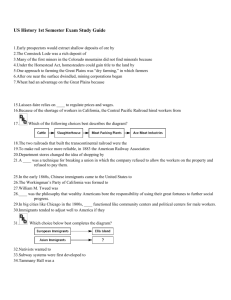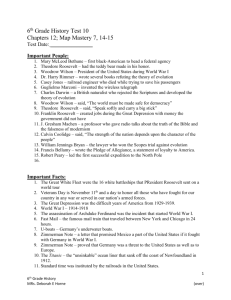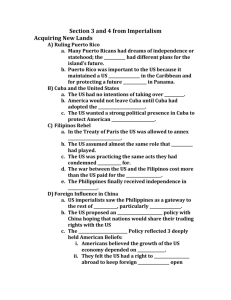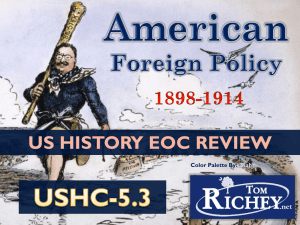The Monroe Doctrine Issued during the Presidency of James
advertisement
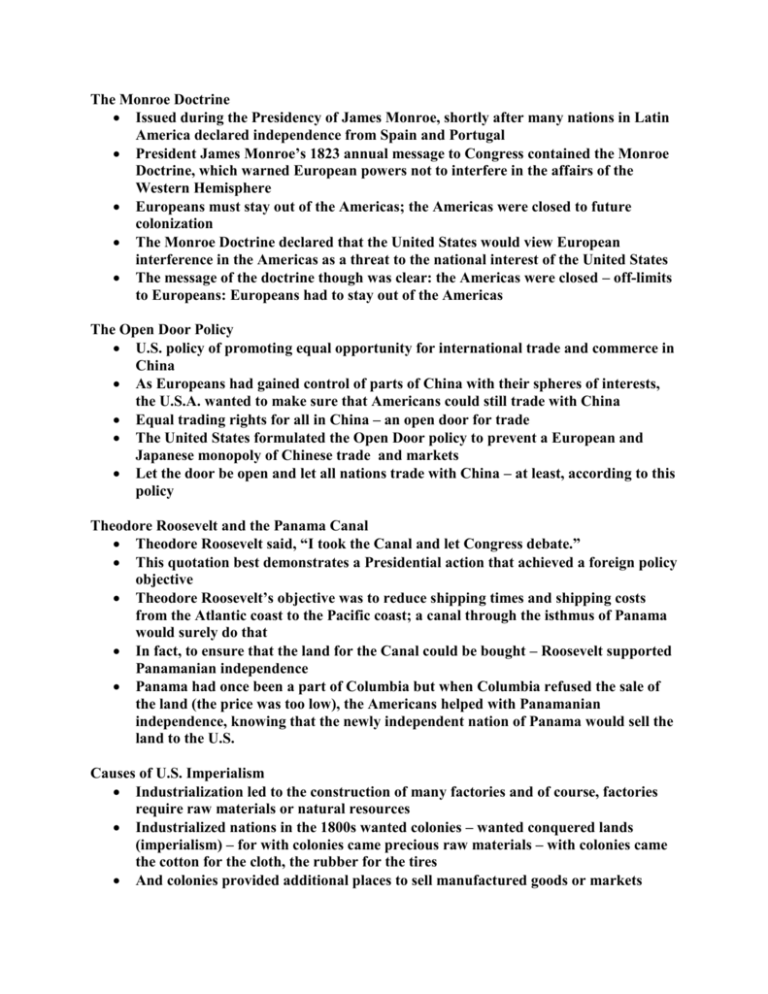
The Monroe Doctrine Issued during the Presidency of James Monroe, shortly after many nations in Latin America declared independence from Spain and Portugal President James Monroe’s 1823 annual message to Congress contained the Monroe Doctrine, which warned European powers not to interfere in the affairs of the Western Hemisphere Europeans must stay out of the Americas; the Americas were closed to future colonization The Monroe Doctrine declared that the United States would view European interference in the Americas as a threat to the national interest of the United States The message of the doctrine though was clear: the Americas were closed – off-limits to Europeans: Europeans had to stay out of the Americas The Open Door Policy U.S. policy of promoting equal opportunity for international trade and commerce in China As Europeans had gained control of parts of China with their spheres of interests, the U.S.A. wanted to make sure that Americans could still trade with China Equal trading rights for all in China – an open door for trade The United States formulated the Open Door policy to prevent a European and Japanese monopoly of Chinese trade and markets Let the door be open and let all nations trade with China – at least, according to this policy Theodore Roosevelt and the Panama Canal Theodore Roosevelt said, “I took the Canal and let Congress debate.” This quotation best demonstrates a Presidential action that achieved a foreign policy objective Theodore Roosevelt’s objective was to reduce shipping times and shipping costs from the Atlantic coast to the Pacific coast; a canal through the isthmus of Panama would surely do that In fact, to ensure that the land for the Canal could be bought – Roosevelt supported Panamanian independence Panama had once been a part of Columbia but when Columbia refused the sale of the land (the price was too low), the Americans helped with Panamanian independence, knowing that the newly independent nation of Panama would sell the land to the U.S. Causes of U.S. Imperialism Industrialization led to the construction of many factories and of course, factories require raw materials or natural resources Industrialized nations in the 1800s wanted colonies – wanted conquered lands (imperialism) – for with colonies came precious raw materials – with colonies came the cotton for the cloth, the rubber for the tires And colonies provided additional places to sell manufactured goods or markets Involvement in the Spanish-American War, acquisition of Hawaii, and introduction of the Open Door policy in China were actions taken by the United States to gain overseas markets and sources of raw materials U.S. imperialism was directly linked to industrialization and the desire for raw materials What President James Monroe and President Theodore Roosevelt Believed about Latin America President James Monroe issued the Monroe Doctrine which stated that Europe must stay out of the Americas – that the Western Hemisphere (the Americas) belong to the Americans President Theodore Roosevelt believed in the Monroe Doctrine and added to it – with his Roosevelt Corollary The Roosevelt Corollary stated that while Europe must stay out of the Americas, the United States may militarily intervene in Latin America when debts needed to be collected or stability needed to be restored The Roosevelt Corollary was part of President Theodore Roosevelt’s “Big Stick” Policy Of course, Latin Americans did not like the Roosevelt Corollary as they thought of it as U.S. paternalism – the U.S. acting like a father or authority over independent peoples President James Monroe and President Theodore Roosevelt held the foreign policy position that a special relationship should exist between the United States and the nations of Latin America The Roosevelt Corollary to the Monroe Doctrine The principle that the United States has the right to act as the “policeman of the Western Hemisphere” and intervene in the internal affairs of Latin American nations was established by the Roosevelt Corollary to the Monroe Doctrine The Roosevelt Corollary was an addition to the Monroe Doctrine The Monroe Doctrine stated that Europe was to stay out of the Americas; the Americas were closed for future colonization The Roosevelt Corollary added that while the Americas were closed to Europeans, the United States could intervene in Latin America U.S. troops often militarily intervened in Latin American affairs Why the United States Intervened in Latin America During the late 19th and early 20th centuries, United States intervention in Latin America was motivated by the United States desire to protect its growing investments in Latin America American businessmen invested heavily in Latin America American businessmen owned farms, railroads, and mines in Latin America To make sure that the investments and profits of American businessmen were protected, the United States government frequently militarily intervened in Latin America to prevent new governments from confiscating American property This intervention benefitted American businessmen but harmed Latin Americans as they lacked self-determination; Latin Americans lacked the ability to determine their own government and laws The Annexation of Hawaii and the Philippines Imperialism occurs when a militarily stronger country conquers a weaker nation or region Industrialization often led to imperialism as newly industrialized nations needed raw materials for factories Annexation means to add a territory to a nation When the United States annexed or added Hawaii and the Philippines to its territories, it was an example of imperialism Yes, imperialism is the United States policy most closely associated with the annexation of Hawaii and the Philippines Yellow Journalism and the Spanish American War Yellow Journalism is to exaggerate the news or to sensationalize the news During the Spanish American War, yellow journalism was used frequently in American newspapers Yellow journalists created support for the Spanish-American War by writing articles about the sinking of the United States battleship Maine in Havana Harbor Spain was blamed for sinking the ship even before all of the facts of the ship’s sinking were reviewed Indeed, Spain may not have been responsible but Americans concluded Spain was guilty due to yellow journalism Definition of Yellow Journalism Exaggerating the news or sensationalizing the news is yellow journalism News organizations were engaging in yellow journalism before the SpanishAmerican War when editors exaggerated events to build support for war Yellow Journalism is not about facts as much as about creating feelings in the reader – anger or shock or surprise It is dangerous as it may lead to the false accusations of innocent people or parties Yellow Journalism was one cause of the Spanish-American War Why the United States Wanted an Open Door Policy in China In the 1800s, many European nations gained spheres of influence in China A sphere of influence meant that a particular European nation controlled a port or ports in China and controlled trade through those ports The United States did not gain a sphere of influence as in the 1800s, the country was primarily dealing with the Civil War Thus, the United States wanted an Open Door Policy in China – it wanted any nation desiring trade with China the right to trade with China The United States issued the Open Door policy (1899–1900) primarily to secure equal trade opportunities in China What Was Necessary to Change from the Indirect to the Direct Election of United States Senators? The original Constitution did not allow for the direct election of Senators and only an amendment can change the Constitution Passed by Congress May 13, 1912, and ratified April 8, 1913, the 17th amendment modified the Constitution by allowing voters to cast direct votes for U.S. Senators Prior to its passage, Senators were chosen by state legislatures But thanks to the efforts of Populists and Progressives, the seventeenth amendment was added to the U.S. Constitution allowing voters to elect Senators The 17th Amendment expanded democracy in the United States by allowing voters to determine each state’s Senators for the U.S. Senate The Purpose of Theodore Roosevelt’s Trustbusting Policies Trustbusting means to break up monopolies; it is anti-monopoly A main purpose of President Theodore Roosevelt’s trustbusting policies was to encourage competition in business Monopolies are bad for consumers as a single seller dominates a market and therefore prices tend to be high and quality inferior By busting up bad trusts or trusts that harm consumers, Teddy Roosevelt increased competition in the United States By increasing competition, consumers benefitted through lower prices and better quality goods Muckrakers Muckrakers were writers during the Progressive era who exposed injustices and corruption in American society and government Ida Tarbell was a muckraker; she wrote The History of Standard Oil about the Rockefeller trust Upton Sinclair wrote The Jungle about the unsanitary and unsafe conditions in the meatpacking industry Jacob Riis wrote How the Other Half Lives about poverty among “New Immigrants” in the cities In the early 20th century, muckrakers were able to influence American society mainly through their publication of articles and books A Goal of Reformers during the Progressive Era A major goal of reformers during the Progressive Era was to correct the abuses of big business Monopolists had a lot of power in American government; they could use their wealth to support politicians and then let politicians create policies that benefited monopolists Reformers wanted to create positive changes in society During the Progressive Era, reformers wanted to improve American government and laws by expanding democracy and reducing corruption and the influence of big business on government Reformers wanted to improve American society by eliminating corruption and injustice Interstate Commerce Act, the Sherman Antitrust Act, and the Clayton Antitrust Act The purpose of the Interstate Commerce Act (1887), the Sherman Antitrust Act (1890), and the Clayton Antitrust Act (1914) was to eliminate unfair business practices All of these acts were created by Congress to prevent monopolistic practices and ensure fairness in markets Approved on February 4, 1887, the Interstate Commerce Act created an Interstate Commerce Commission to oversee the conduct of the railroad industry – with this act, the railroads became the first industry subject to Federal regulation Approved July 2, 1890, the Sherman Anti-Trust Act was the first Federal act that outlawed monopolistic business practices The Clayton Antitrust Act supplemented existing laws against unlawful restraints and monopolies, and for other purposes The Federal Reserve System The Federal Reserve System is the central bank of the United States The United States Federal Reserve System was established to regulate the money supply It was founded by Congress in 1913 to provide the nation with a safer, more flexible, and more stable monetary and financial system Over the years, its role in banking and the economy has expanded The Federal Reserve System has three functions: monetary policy, supervision and regulation, and financial services The Meat Inspection Act The Meat Inspection Act was passed as a result of muckraking Thanks to Upton Sinclair’s The Jungle, Congress passed this act to ensure the safety of the nation’s meat supply It requires the inspection of meat and meat food products There must be an examination of animals before slaughtering and diseased animals must be slaughtered separately and carcasses examined Meat products must also be labelled – consumers have a right to know what is actually in a hot dog or other meat product Jacob Riis Famous muckraker Wrote How the Other Half Lives about the poverty of the “New Immigrants” in the cities In How the Other Half Lives, Jacob Riis described the living conditions of workers in urban slums A slum is a densely populated (lots of people), run-down, squalid (unsanitary and dirty) part of a city Factory workers often lived in unsanitary and overcrowded slums Women, Suffrage, and the Progressive Era The right to vote was a long-awaited goal of the women’s rights movement that was achieved during the Progressive Era Suffrage means the right to vote Women had to wait for the Nineteenth Amendment to finally gain the right to vote Passed by Congress June 4, 1919, and ratified on August 18, 1920, the 19th amendment granted women the right to vote Women had waited a long time (the Seneca Falls Conference – the first ever women’s rights conference occurred in 1848 in New York)and had protested for many decades to gain this right which was finally given after the First World War as many women contributed to the war effort and helped win the war Jane Addams During the Progressive Era, Jane Addams responded to urban conditions by working to establish settlement houses that provided assistance to the poor Hull House was an important settlement house established by Jane Addams Hull House was a vital community center for poor immigrant workers in Chicago In 1889, Jane Addams and a friend, Ellen Gates Starr, rented a run-down mansion that once had belonged to a man named Charles Hull – the house stood in one of Chicago’s industrial areas Many European immigrants who had come to the U.S. seeking a better life, lived in the neighborhood and lived in crowded, dirty tenements – most worked in nearby factories, earning barely enough money to feed their families. Addams and Starr hoped that Hull House would bring some light into the lives of the urban poor by providing day care facilities, English classes, and opportunities to learn new skills Theodore Roosevelt and Panamanian revolt, Russo-Japanese war, and Creation of National Parks The Panamanian revolt, the Russo-Japanese war, and the creation of the national parks system occurred during the presidency of Theodore Roosevelt Theodore Roosevelt was responsible for acquiring the land from Panama to build the canal and instrumental in helping Panama gain independence from Colombia to get the land for the canal which Columbia had refused – the price was too low Theodore Roosevelt was a conservationist and wanted to protect nature; he was instrumental in the creation of the national parks The Treaty of Portsmouth formally ended the Russo-Japanese War of 1904-05; the negotiations took place in August in Portsmouth, New Hampshire, and were brokered in part by U.S. President Theodore Roosevelt – Roosevelt won a Nobel Peace Prize for his involvement The Sixteenth Amendment to the U.S. Constitution The federal income tax was authorized by the 16th amendment in 1913 Passed by Congress on July 2, 1909, and ratified February 3, 1913, the 16th amendment established Congress’s right to impose a Federal income tax The 16th amendment is an important amendment that allows the federal (United States) government to levy (collect) an income tax from all Americans Income tax allows for the federal government to keep an army, build roads and bridges, enforce laws and carry out other important duties The federal government realized in 1913 that in order for it to collect taxes effectively, and not have to share that tax money with the states, federal income tax was necessary The “New Immigrants” In the late 19th century, the pattern of United States immigration changed in that increasing numbers of immigrants came from eastern and southern Europe The “New Immigrants” were from Southern and Eastern Europe and were predominantly Roman Catholic and Jewish They differed from the “Old Immigrants” in that the “Old Immigrants” were predominantly from Great Britain – Northern Europe – and Protestants The “New Immigrants” faced discrimination and prejudice The “New Immigrants” were often factory workers living in urban slums Gentlemen’s Agreement, Literacy tests, and the Quota System The Gentlemen’s Agreement, literacy tests, and the quota system were all attempts by Congress to restrict immigration The Gentlemen’s Agreement was written between the United States and Japan in 1907-1908 and represented an effort by President Theodore Roosevelt to calm growing tension between the two countries over the immigration of Japanese workers Japan agreed not to issue passports to emigrants to the United States, except to certain categories of business and professional men and in return, President Theodore Roosevelt agreed to urge the city of San Francisco to rescind (cancel) an order by which children of Japanese parents were segregated from white students in the schools A provision of the Immigration Act was the literacy test imposed on immigrants entering the country; those who were over the age of 16 and could read some language must read 30 to 40 words to show they are capable of reading – this too was meant to restrict immigration from Southern and Eastern Europe The Immigration Act of 1924 limited the number of immigrants allowed entry into the United States through a national origins quota; the quota provided immigration visas to two percent of the total number of people of each nationality in the United States as of the 1890 national census and completely excluded immigrants from Asia – these quotas were designed to decrease immigration from Southern and Eastern Europe The Goals of the Populist Party Free and unlimited coinage of silver and government ownership of railroads were goals of the Populist Party A graduated income tax was another goal of the Populist Party The Populist Party was the first political party that proposed these reforms – free and unlimited coinage of silver, government ownership of railroads and a graduated income tax – in its platform Populists were a party founded to advocate for the rights of farmers The People’s party, more commonly known as the Populist party, was organized in St. Louis in 1892 to represent the common folk – especially farmers – against the entrenched interests of railroads, bankers, processers, corporations, and the politicians in league with such interests Farmers and the Railroads Farmers dislike the railroad companies in that railroads charged higher prices for shorter distances thereby harming farmers “Transportation being a means of exchange and a public necessity, the government should own and operate the railroads in the interest of the people” (1892) – the group that would show the greatest support for this idea would be western farmers Since railroads were essentially monopolies – as no other train track ran through a town – prices could be too high and unjust Thus, farmers wanted the government to regulate or control pricing in the railroad industry By regulating the railroads, farmers would not face pricing discrimination Manifest Destiny and the Homestead Act The idea that the United States should stretch from the Atlantic to the Pacific – that God had given all of that land to the United States The Homestead Act was a Federal Act granting free land to Americans willing to move West onto the Great Plains – if within five years, settlers could make a working farm – this Act encouraged westward expansion Yes, Manifest Destiny and the Homestead Act encouraged westward expansion The passage of the Homestead Act and the completion of the transcontinental railroad helped to fulfill the United States commitment to manifest destiny By moving Americans west, Americans populated all the land from the Atlantic to the Pacific Booker T. Washington Booker T. Washington believed that the most immediate means for African Americans to achieve equality was to expand their opportunities for vocational education Booker T. Washington had been born into slavery and wrote an autobiography titled Up From Slavery The foremost black educator, power broker, and institution builder of his time, Booker T. Washington in 1881 founded the Tuskegee Institute, a school for African Americans in Alabama devoted to industrial and moral education and to the training of public school teachers Booker T. Washington believed economic advancement would lead to equality By improving economic status, the African American community would gain political rights Abraham Lincoln and a House Divided Abraham Lincoln once said, “A house divided against itself cannot stand…I do not expect the Union to be dissolved; I do not expect the house to fall; but I do expect it will cease to be divided. It will become all one thing, or all the other…” The “divided house” referred to in this speech was caused primarily by slavery The nation was divided by free states and slave states Lincoln gave this speech before the Civil War He believed that a country divided so greatly could not stand unless it resolved the issue, resolved the difference The Great Compromise Establishing the formula for representation in Congress was a problem solved by the Great Compromise at the Constitutional Convention of 1787 The Great Compromise was a compromise between “big” states with large populations or lots of people and “small” states with fewer people The Great Compromise created a bicameral Congress – a Congress with two Houses, a House of Representatives and a Senate The number of representatives each state is allotted is based on the number of people in that state – thus, the taking of the census every ten years to determine each state’s population In the Senate, however, every state receives two Senators Marbury v. Madison An important Supreme Court case; established the principle of judicial review Judicial review is the Court’s ability to declare a law unconstitutional Chief Justice of the case was John Marshall Marshall strengthened the power of the Federal Government The significance of the Supreme Court case Marbury v. Madison is that the decision established the power of judicial review George Washington and Neutrality George Washington said, ““Our true policy is to steer clear of permanent alliances…” President Washington made this statement to warn against United States involvement in European military conflicts As the United States was a new nation, it could not afford to be drawn into costly European conflicts The nation needed time to grow and thrive Thus, Washington encouraged neutrality – no alliances leading to wars Nativism An anti-immigrant attitude Nativism in the late 19th century was motivated primarily by hostility toward immigrant workers The “New Immigrants” from Southern and Eastern Europe were culturally different from the “Old Immigrants” – they were often Catholics and Jews and did not speak English The “New Immigrants” found employment in the newly industrialized cities and worked in the factories; they often lived in tenements and slums, neglected parts of the cities The “Old Immigrants” feared that the “New Immigrants” would negatively change the United States but the “New Immigrants” just wanted job opportunities and better lives – they assimilated and became Americanized Samuel Gompers, Terence Powderly, and Eugene Debs During the late 19th century, Samuel Gompers, Terence Powderly, and Eugene Debs were leaders in the movement to improve working conditions Samuel Gompers was a union leader; he founded the American Federation of Labor – a craft union of skilled workers Terence Powderly was a leader of the union known as the Knights of Labor Eugene Debs was a union leader of the Industrial Workers of the World Unions are organizations of workers that seek to improve working conditions, wages, and hours Where Most “New Immigrants” Lived The “new immigrants” who arrived in the United States from southern and eastern Europe in the late 1800s and early 1900s lived in urban areas and most held lowpaying jobs They worked in factories – long hours, low wages, and unsafe working conditions They lived in tenements or run-down and often overcrowded apartment buildings They lived in slums or densely populated, run-down, squalid or dirty parts of cities They faced discrimination due to nativism or anti-immigrant attitudes Andrew Jackson and Spoils System During the presidency of Andrew Jackson, the spoils system resulted in elected officials rewarding their supporters with government jobs The Spoils System was a system whereby a newly elected official would reward his supporters with government jobs The Spoils System hoped to bring more people into government in that with every new election, a new group of workers would be hired for government service Of course, the Spoils System could also be corrupt – in that people get jobs because of who they know rather than what they can do Today, the Spoils System is not used instead there is a civil service system where government workers have to pass tests to be employed Electoral College and Census Americans vote for electors – electors vote for the President Each state has a certain number of electors to vote for the President in the Electoral College A state’s number of electors is based on its number of representatives in the House of Representatives and its two Senators Thus, the census is really important as it records each state’s population every ten year to determine how many representatives each state receives in the House of Representatives and therefore the number of electors each state receives in the Electoral College Yes, population data from the census of 2000 was used to determine the number of electoral college votes from each state Importance of New Orleans and the Louisiana Purchase The United States purchased the Louisiana Territory from France Thanks to the Louisiana Purchase, the United States acquired full control of the Mississippi River, the Great Plains, and the port of New Orleans The port of New Orleans was particularly important because it connected the Mississippi River to the Gulf of Mexico Acquiring New Orleans as part of the Louisiana Purchase was considered important to the development of the Mississippi and Ohio River valleys because the city served as a port for American agricultural goods The port of New Orleans was good for trade Erie Canal It connects the Hudson River in New York State to the Great Lakes Canals make transportation easier and connect important bodies of water The Hudson River flows all the way to New York City An immediate effect of the completion of the Erie Canal in 1825 that farmers could more easily ship grain to eastern markets The Erie Canal was a valuable means of transportation – allowing farmers in the Ohio River Valley to ship goods to New York City Thomas Paine and Common Sense as well as a Criticism of Mercantilism Thomas Paine wrote the pamphlet – “Common Sense” – to encourage colonists to fight for independence He wanted the colonists to declare independence as British mercantilism hurt the colonists – what was good for the Mother Country was not good for the colonists In the pamphlet, Paine stated, “Our corn will fetch its price in any market…” According to mercantilism, a colony must trade with the Mother Country which was good for the mother country but bad for the colony The colony did not need the mother country because it could sell its resources and goods to any country, to any market – thus, declare independence – freedom has its benefits Reasons for Sectional Differences in the United States Sectional differences in the United States were often due to geographic differences Plantations arose in the South because of the South’s fertile soil and long growing season The geography of the North did not support a plantation economy and therefore did not rely on slavery Sectional differences developed in the United States largely because economic conditions and interests in each region varied These sectional differences eventually divided the nation in a Civil War Abraham Lincoln’s Justification for the Civil War President Abraham Lincoln’s justification for the Civil War was that he, President Lincoln, had taken an oath of office that required him to defend and preserve the Union Yes, Lincoln promised to preserve the Union – to keep the Union united He also believed that the Union was a union of the people and not of the states Therefore, he did not believe that a state could legally seceded or withdraw from the Union He wanted to preserve the Union – the Union of “We the People…” Purpose of Literacy Tests for Voting in the South The main intent of the literacy test in the South after the Civil War was to prevent African Americans from exercising a basic right The literacy test was used to deny African Americans their constitutional right to vote As one African American noted, “[The registrar] brought a big old book out there, and he gave me the sixteenth section of the constitution of Mississippi, . . . I could copy it like it was in the book, but after I got through copying it, he told me to give a reasonable interpretation and tell the meaning of the section I had copied. Well, I flunked out.” The failure of Reconstruction is evident in the denial of rights that African Americans experienced in the American South Poll taxes, literacy tests, and grandfather clauses prevented African Americans from voting in the American South Poll Taxes and Grandfather Clauses A poll tax is a tax on voting – it was used in the American South to prevent African Americans from voting A grandfather clause basically stated that if a man’s ancestors had voted before the Civil War, he could vote and did not have to take the literacy test or pay the poll tax Of course, the only individuals who could vote before the Civil War were white men; therefore African American men after the Civil War were prevented from voting with poll taxes and grandfather clauses Poll taxes and grandfather clauses were devices used to deny African Americans the right to vote Today, poll taxes and grandfather clauses are illegal Plessy v. Ferguson An important Supreme Court case Ruled that segregation in the South was constitutional Stated that “separate but equal” was legal Of course, this was a travesty of justice – this was a grave injustice – because separate facilities were never equal and segregation had harmful effects on individuals The Jim Crow laws, upheld by the Supreme Court in Plessy v. Ferguson (1896), provided for separate public facilities based on race This ruling was reversed in the 1950s – Brown v. the Board of Education ruled segregation in public schools illegal Reason for Impeachment of President Andrew Johnson The underlying reason for the impeachment of President Andrew Johnson was a power struggle with Congress over Reconstruction President Andrew Johnson had a different plan for Reconstruction than the Radical Republicans The Radical Republicans wanted to punish Confederate officers and provide full legal rights of African American men Johnson wanted a lenient plan for Reconstruction that would have forgiven many Confederates and not thoroughly changed the South As a result of this division, Johnson was impeached but he was not found guilty and stayed President W.E.B. DuBois A significant African American scholar Wanted full equal rights for African Americans W.E.B. Du Bois believed that African Americans should attempt to gain equality in the United States by demanding full and immediate participation in American society The Reconstruction Amendments – 13th (abolishing slavery), 14th (equality for all male citizens), and 15th (voting rights for all male citizens) – had been added to the Constitution and therefore were the rights of African American men There was no need to wait for equality – equality was now! Impact of Homestead Act and Mass Killing of Buffalo on Plains Indians The Homestead Act gave free land to Americans willing to move West and make a working farm in five years This government action encouraged westward expansion As Americans settled the Great Plains, they killed the buffalo and forever changed the ways of the Plains Indians Without the buffalo, the Plains Indians could not survive The Homestead Act, the mass killing of buffalo, and the completion of the transcontinental railroad are most closely associated with the decline of the Plains Indians – westward expansion destroyed the Native American Indians System of Checks and Balances To avoid having too much power concentrated in one branch of government, the framers of the Constitution established the system of checks and balances American government is divided into three branches: an executive branch, legislative branch, and judicial branch Each branch has different powers, different responsibilities And each branch can check or limit the power of the other branches to ensure that one branch does not have too much power Thus, the President can veto a bill of Congress or the Supreme Court can declare a law of Congress unconstitutional – by limiting power, tyranny is prevented.

